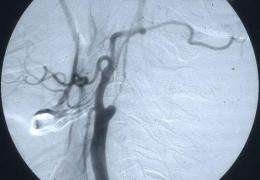Surgery can lead to long-term reduction in stroke risk

(PhysOrg.com) -- Successful surgery for narrowed arteries in the neck halves the risk of having a stroke over the next 5 years, and benefit persists for at least 10 years, an Oxford-led study has shown.
However, operating on the main arteries that take blood to the brain involves about a 3% risk of causing an immediate stroke.
Otherwise healthy patients who are discovered to have substantial narrowing of either of the main arteries in the neck are at an increased risk of having a stroke in the future. An operation, called a carotid endarterectomy (CEA), can remove the fatty deposits narrowing the artery, but the procedure itself causes some immediate risk of stroke or death.
In this long-running randomised trial, the researchers assessed whether the benefits of successful CEA procedures in reducing the likelihood of a stroke over the next 5 or 10 years balanced out the immediate risks of surgery in these patients.
The researchers conclude that there is likely to be net benefit from operating on those in good health under 75 years old, as long as the surgical risks remain low. Among older patients the immediate risk of surgery may outweigh the long-term benefit, however.
The study, published in the medical journal The Lancet and involving researchers from 30 countries, was led by Professor Alison Halliday of the Nuffield Department of Surgical Sciences and Professor Sir Richard Peto of the Clinical Trial Service Unit at the University of Oxford.
The study involved 3120 patients with narrowed carotid arteries in the neck where there was uncertainty about whether or not to have the surgery. Half were randomly allocated to have the operation immediately, and half to have indefinite deferral of the procedure until there was a definite need for it.
Among those who had surgery, the risk of stroke or death during or soon after the procedure was 3%.
But those who had surgery had a substantial reduction in their subsequent risk of a stroke. After 5 years, the stroke risk among those who had surgery immediately was 4.1% versus 10% for those who didn’t. At 10 years, the risk was 10.8% among those who had the surgery against 16.9% in those who did not.
Professor Halliday said: ‘This trial took more than 15 years to complete because we wanted to know about the long-term effects of surgery.
‘The definite benefits that we have found will be of practical value to doctors and patients deciding in the future whether to take the immediate risk of having such surgery.’
The study was funded by the Medical Research Council, the BUPA Foundation and the Stroke Association.
















